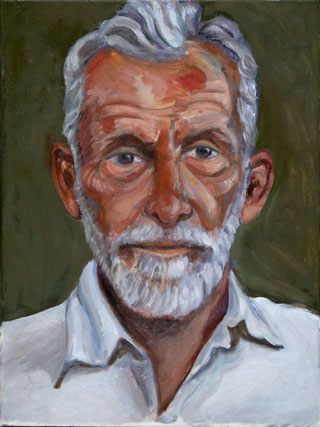“I really think hunting-gathering is the highest state we’ve reached as a species because agriculture, you get into banking, you get into the illusion of safety and all of that… and there’s a real cooperative aspect to it too. You’re just never sharper than when you have to be a hunter-gatherer.”
–Hank Meals
An Excerpt from the Interview
NCSCC: Why is it important to know the story of the land?
Hank Meals: Well around here, it’s really interesting. I think history is about consequences and nothing more glaring than hydraulic mining, but at the time those decisions were being made, this was all about productivity and it seemed like a fabulous idea and everybody was in agreement with it. And that’s just a very obvious example about how it wasn’t for years that we learned about methyl mercury and things like that.
So it’s a lot different. And what that does is make you reflect on where you’re at now, something we think is a hell of a good idea. Like, maybe all of us being in at least two-car families may turn out to be not such a great idea in the future. So I think it informs your decisions. Plus this area really resonates. I mean, if you know anything at all about it, and I’m incessantly trying to turn people onto it. Just like I said, there’s a story everywhere. You can look at any landscape around here and there’s a story that goes with it.
NCSCC: I know when I have people come from out of the area, I have my little places I take them to get them oriented to here, and certainly go to Malakoff. I mean, you can’t be here and not go there to just look, just to see it at first. And then you know, take them to the river. Where do you take people? Or, where are the places you like to show people what this place is about?
Hank Meals: Well I like to give them a taste of the different ecosystems. I might do a little hike in Spencerville, Bridgeport, Humbug Creek, a pyre near Spaulding up on the summit. Because really, especially for the indigenous people, that’s the way it was played. You moved up and down the hill with the seasons. You had different resources at different times, so you knew at least your central ecosystem and the one below and the one above at the very least. And each one of them has a different historic story too, transportation up at the summit, railroad, roads, et cetera. Even indigenous people went back and forth. And it goes on and on. But usually I like to give them a taste of the different ecosystems, because really we’re only a couple miles apart. You drive up the road and it’s amazing, even right here, Graniteville Road.
NCSCC: You’ve put a lot of words into the Yuba River books. Are there more coming? It’s interesting to me, I’ve got this (copy) — I don’t know if that’s the original.
Hank Meals: That’s the original.
NCSCC: That is the original. We got this before we lived up here. We bought land, but we hadn’t moved in yet, and I don’t know where I got it from but it’s really informed me. I take your hikes and I take the book along and I read about everything and it’s such a great resource. I love how you sort of are the host. You introduce people to the land.
Hank Meals: Well, I read a lot of esoteric documents. You read archaeological reports, it could put you to sleep. I mean people have to appear profound. You have to impress your peers in addition to CEQA and NEPA requirements in the formats that go with that. But it winds up being practically unreadable. I’m committed to interpreting that. I just think that surely there’s a way we can just talk in straight English about this. What’s the significance about this event? And a lot of work I get today is in interpretation. I just really like that.
•
NCSCC: With the next wave of people, with the next wave of decisions that get made here, how are we going to govern? How hands-off are we going to be? And like you said before, maybe it’ll turn out that some of our decisions we make really aren’t good ones. How do we know that? Let’s take the mine, the mine that’s being proposed to be re-opened here, if that’s something you want to comment on.
Hank Meals: Yeah, that’s interesting. You have to respect that mining is a traditional way to make money here. You can’t exclude those people. So can it be done in a reasonable way? The gold is at bedrock with millions of cubic yards of overburden and hydraulicking had to do with blasting all that away. Now they’re essentially going in by drifting, but the amount of water they’re using to process the gravel is a huge consideration because we all know the water comes from the seasonal water percolating down. And to lose a whole lot of it on one little operation seems selfish. And how many people are actually going to benefit by that?
So mining may not be a great idea. Maybe we ought to rethink gold period about it having value. As far as I know right now, most of it’s used in India for a display of wealth. I don’t know. I mean, the indigenous people had no use for it whatsoever. Possibly net weights is the only thing I can think of, because it’s so heavy. Other than that, they had no use for it whatsoever. What’s of value, what they valued, was things they didn’t have like abalone shells and clam shell disc beads that were traded in from other areas. Out here, you could trade flicker feathers, black oak acorns, things that other people don’t have.
So I don’t know about gold. I mean, the big changes I see underway right now is one of the focal points, one of the ways we built community and kept it broad, was through the school. And now you have a real tendency for people to pull out of the public school system, and they always talk about my child and my choice and all of that. But I don’t know. Personally, I think there’s more to be gained by putting your juice into the public school and making it truly public. It’s my opinion. It’s probably outdated by then. And then the other big one is of course the big pot phenomenon here where we have people who only show up for growing season, may stop at Ma Trucks for beer, but they don’t give us anything. And they’re part of the water problem too. Are they lowering the water table? I don’t know when you consider the volume of it.

